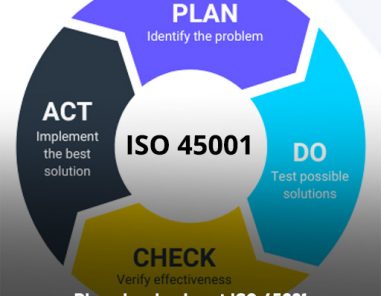
Plan-do-check-act ISO 45001
The “Plan, Do, Check, Act” (PDCA) cycle is widely recognised as a staple of I...
Read MoreThe ISO 14001 standard outlines the criteria for an Environmental Management System (EMS). This standard does not state the requirements for an organisation‘s environmental performance, rather, it maps out a framework that an organisation can follow to set up an effective EMS. The recommendations outlined in the standard can be used by any organisation that wants to improve resource efficiency, reduce waste as well as minimise costs.
Utilising the guidelines of the ISO 14001 standard can provide assurance to top management, employees as well as external stakeholders that the organisation’s environmental management impact is being measured and improved. One of the biggest benefits of ISO 14001 is that it can be easily integrated with other management functions, thereby assisting companies in meeting their environmental goals in addition to their economic goals.
One of the most frequent questions we are asked at ISO Consulting Australia is whether ISO 14001 is a legal requirement? In this article, we answer this question.

When talking about legality, ISO 14001, like the other ISO standards is purely voluntary. The voluntary status of the standard aims to assist companies in continually improving their environmental performance and complying with applicable legislation.
Additionally, the voluntary status is what enhances an organisation’s brand credibility, as consumers understand that there was no compulsory legal obligation for the company to improve its environmental performance, yet the company choose to do it. As a result, a stark difference between the company’s image and its competitors is created in the eyes of the consumers. The consumers now view the company as conscientious, honest and transparent.
This is the reason why, despite not having mandatory status, many organisations actively vie for ISO 14001. Now, having established that acquiring ISO 14001 is not a legal requirement, it is necessary to understand compliance legal requirements in context of the standard. In this article, we discuss the requirements that must be taken into account when an organisation is attempting to establish and maintain its EMS.

Compliance to legal requirements refers to an organisation’s adherence to the laws, standards or specifications of the sector in which it operates. When talking about compliance with the legal requirements of ISO 14001, it includes:
The environmental policy of an organisation should reflect the commitment of the top management to comply with the applicable legal requirements as well as a clear definition of the necessary resources needed for adequate support. Usually, this commitment is expanded in the form of a simple statement, whereas the identification of those requirements is explained in the other clauses of ISO 14001.
In other words, when talking about the outlining commitment, the scope statement defines the organisation’s objectives, environmental policies, management goals and the necessary voluntary initiatives that the organisation chooses to comply with.
The clause 4.3.2 of ISO 14001 states that an organisation should know applicable legal requirements related to their activities and services. This is an important guideline to understanding the necessary legal obligations of an industry. For example, an organisation can find environmental regulations on the website of government agencies in charge of environmental protection. From the wide list of regulations that are available, organisations can choose those that are applicable to their business, popular in the sector and align with their objectives.
The clause 4.3.3 of ISO 14001 states that when an organisation establishes its environmental objects, it should take its legal requirements into account. Hence, the organisation should begin by identifying the applicable legal requirements that they are partially in compliance with or specific regulations that they are abiding with. Subsequently, during the implementation phase, the organisation should have instruments in place for dealing with the legal requirements. For example, an organisation should have sufficient documents to demonstrate compliance.
Additionally, other examples of such instruments include outlining responsibilities for compliance related requirements and identifying training needs for compliance related processes.
It is necessary to conduct periodic evaluation as organisational outputs are ever-changing. The dynamic nature of output and processes mean that even if the organisation is in compliance today, there is no assurance that it will remain compliant in another six months. This is especially important for environmental processes, as interaction of an organisation with the environment is dependent on many dynamic or volatile factors.
For example, minor changes in your output could directly affect the amount of gases you emit or the waste you produce. Therefore, regular testing is necessary to see whether the outputs are below legal limits. Whenever non-compliance with legal requirements is discovered, the organisation is required to take immediate corrective actions.
Examples of such corrective actions include root cause analysis, taking the necessary steps to prevent recurrence or acquiring help from environmental regulators. Depending on the magnitude of the non-compliance and the specifications of the legal requirement, the nature of the corrective actions will vary.

Clause 4.6 of ISO 14001 requires the environmental management representative to inform top management about the results of the compliance evaluation. The results of the evaluation of compliance and possible changes in legal requirements are communicated in the management review. During these reviews, top management is made aware of the risks of potential and actual noncompliances and have to demonstrate commitment to legal compliance by taking the necessary steps.
ISO certification gives your organisation a competitive edge. By helping you increase operational efficiency and overall product consistency, your business credibility and authority will soar to new heights.

Copyright © 2025 The ISO Council | Privacy Policy